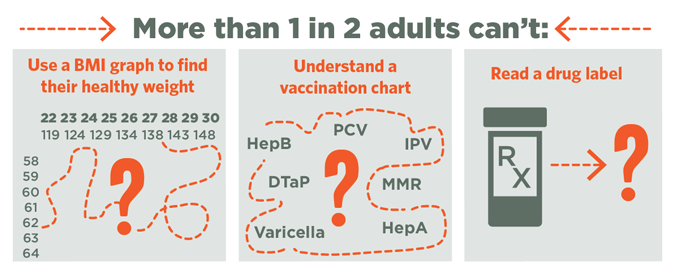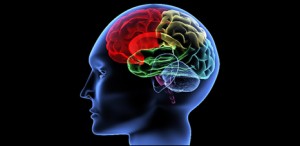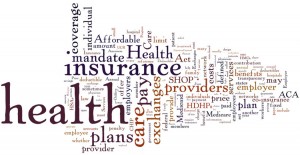It Begins with You
Health Literacy -> DefinitionsDefinitions
Below are definitions of General, Behavioral, and Insurance Health Literacy.
General Health Literacy
The Affordable Care Act defines health literacy as, “the capacity to obtain, communicate, process, and understand basic health information and services to make appropriate health decisions.”
The World Health Organization (WHO) defines health literacy as the “cognitive and social skills which determine the motivation and ability of individuals to gain access to, understand, and use information in ways which promote and maintain good health” (WHO, 1998). The WHO concludes, “By improving people’s access to health information and their capacity to use it effectively, health literacy is critical to empowerment” (Nutbeam, 2000).
The American Medical Association (AMA) defined health literacy as, “The constellation of skills, including the ability to perform basic reading and numeral tasks required to function in the health care environment” (AMA, 1999).
Others specified that health care consumers must employ print literacy (writing and reading); oral literacy (listening and speaking); and numeracy (using and understanding numbers, such as medication doses) (Koh et al. (2012)).
Evolving literacy and health definitions include broader notions of learning and societal context (Sørensen et al., 2012). Widely cited definitions include individual skills and processes (e.g., informed decision making); outcomes (e.g., good health, quality of life); and the social and political contexts in which these processes and outcomes reside (e.g., health promotion, disease prevention).

Behavioral Health Literacy
 Individual and collective empowerment are included as outcomes of mental health literacy:
Individual and collective empowerment are included as outcomes of mental health literacy:
“Mental health literacy involves a range of skills and abilities that develop over time, within individuals and communities. As people gain more knowledge and become more adept at critically analyzing information, personal and social empowerment increases. Ultimately, this builds capacity for informed personal choice, as well as collective action on the broader social and environmental determinants of mental illness and mental health.” (CAMIMH 2008, pp. 7–8).
 Mental health literacy began to appear in the literature in the late 1990s. Most information on mental health literacy relates to general public education campaigns and Mental Health First Aid training and responding to mental health crises. There is an absence of materials/definitions of substance use- addictions literacy.
Mental health literacy began to appear in the literature in the late 1990s. Most information on mental health literacy relates to general public education campaigns and Mental Health First Aid training and responding to mental health crises. There is an absence of materials/definitions of substance use- addictions literacy.
Vancouver, British Columbia established a Provincial Health Literacy Strategy in Mental Health and Addiction. Focused narrowly on improving public understanding and reducing stigma related to mental health and substance use problems.( Kraglund-Gauthier, Folinsbee, Quigley, and Grégoire, (2009) Mental Health and Addiction Services)
Jorm et al. (1997) mental health literacy is “knowledge and beliefs about mental disorders which aid their recognition, management, or prevention.”
Link et al., 1999; Jorm et al., 2006a, 2006b, Mental health literacy is assessed in terms of how public knowledge mirrors professional knowledge and beliefs.
Lauber et al. (2003), define mental health literacy as “knowledge and beliefs about mental disorders, coupled with the ability to access, understand, and use information to recognize and manage disorders.”
Leichty, (2011) mental health literacy refers to general awareness of mental disorders and the reduction of stereotypes of, and discrimination against, people diagnosed with mental illnesses.
Insurance Health Literacy
Health Insurance literacy supports the ability to:
- compare the key features of several health plans;
- understand the scope of covered services and the cost-sharing provisions associated with categories of services;
- understand and assess the adequacy and fit of provider networks for self/family health care needs;
- assess the quality of each plan in terms of measures and personal needs;
- understand basic Explanation of Benefits;
- understand appeal rights; and
- know how and where to turn for information and assistance.
“Health insurance literacy measures the degree to which individuals have the knowledge, ability, and confidence to find and evaluate information about health plans, select the best plan for their own or their family’s financial and health circumstances, and use the plan once enrolled.” (Quincy, (2012))
Somers and Mahadevan report on the role of health literacy in the implementation of the Affordable Care Act (2010): “Individuals’ abilities to do designated tasks will impact the successful implementation of ACA. These include: Understand how health coverage works (eligibility, enrollment, and coverage); Interact with health insurers and providers (communication and health information); and Engage effectively in systems of care (health promotion, prevention, wellness, and health services).”
Somers and Mahadevan go on to specify that, “Those with behavioral health conditions represent a potential risk as they are less likely to be health literate than the general population.”
